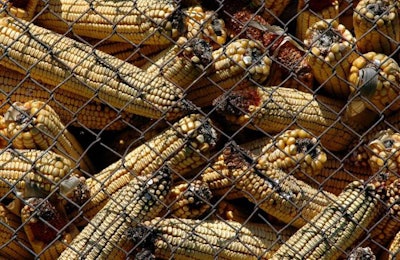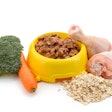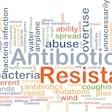
New research shows negative effects of fumonisins begin just above FDA guidance level in pigs
Nursery pigs begin to experience noticeably decreased growth performance when fed corn contaminated with fumonisins in excess of the U.S. Food and Drug Administration’s (FDA) guidance level, according to a new report from Kansas State University.
Pigs in the study experienced minimal losses when raised on diets containing up to 21.9 mg/kg fumonisin, according to the university’s report, published in the journal Toxins. Performance decreased linearly with increased inclusion of the mycotoxin, with the greatest losses recorded in the study occurring when the pigs were fed 32.7 and 35.1 mg/gk fumonisin. Pigs fed these diets in the experiment gained 2 pounds less during the 28-day trial, according to Zhong-Xing (Johnson) Rao, the study’s lead author and a graduate research assistant at Kansas State University.
Pigs in the trial saw greater weight gains during the final half of the experiment, suggesting they may have become acclimated to the contaminated feed over time, according to the report. However, pigs fed the higher concentrations of fumonisins did not catch up to the pigs on the lower fumonisin diets by the end of the study.
Rao said the university happened upon the opportunity to run the fumonisin study when Kansas State received a portion of corn contaminated with high levels the mycotoxin in 2018, after the severe flooding that took place that summer. Previous studies used to establish the FDA’s recommended screening level for animal feed have used purified fumonisin toxins or cultured feed materials, rather than naturally contaminated corn, which may contain co-occurring mycotoxins or lack nutritional content due to damage to the crop, so the researchers jumped at the chance to test the naturally contaminated product to compare its performance to past laboratory trials.
To produce diets with varying amounts of fumonisin, researchers blended the contaminated corn, which contained about 50 mg/kg of fumonisin, with corn containing minimal fumonisin to create diets with 7.2, 14.7, 21.9, 32.7, and 35.1 mg/kg fumonisin. While pigs fed the 21.9 mg/kg diet exhibited minimal weight losses, the researchers note in their report that additional research is needed to determine where between 21.9 mg/kg and 32.7 mg/kg the effects of fumonisn contamination become more severe.














